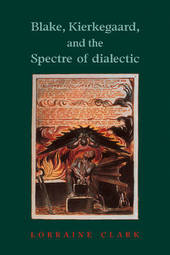
|
Blake, Kierkegaard, and the Spectre of Dialectic
Paperback / softback
Main Details
| Title |
Blake, Kierkegaard, and the Spectre of Dialectic
|
| Authors and Contributors |
By (author) Lorraine Clark
|
| Physical Properties |
| Format:Paperback / softback | | Pages:252 | | Dimensions(mm): Height 229,Width 152 |
|
| Category/Genre | Literary studies - c 1800 to c 1900
Literary studies - poetry and poets
Western philosophy - c 1600 to c 1900 |
|---|
| ISBN/Barcode |
9780521110471
|
| Classifications | Dewey:821.7 |
|---|
| Audience | | Professional & Vocational | |
|---|
| Illustrations |
Worked examples or Exercises
|
|
Publishing Details |
| Publisher |
Cambridge University Press
|
| Imprint |
Cambridge University Press
|
| Publication Date |
7 May 2009 |
| Publication Country |
United Kingdom
|
Description
Blake's late prophecies, The Four Zoas, Milton and Jerusalem, feature a conflict between the poet-prophet Los and a Spectre embodying all he most opposes: intellectual scepticism, religious despair and a systematic philosophical logic of contraries, which is for Blake an abstraction from, and negation of, his ideal of 'life'. In this 1991 book, Lorraine Clark traces the analogy between Blake's Spectre and Soren Kierkegaard's concept of 'dread', whose spirit of negation and irony he seeks to conquer, in both its philosophical and aesthetic manifestations. Using Kierkegaard's philosophy to illuminate Blake's prophecies, Lorraine Clark shows these concepts to offer the basis for a profound critique both of romanticism, as it has come to be identified with the spirit of dialectic, and of the postmodern irony which it has spawned. Their attempt to rescue an ideal of life from its abstraction within idealist dialectics is itself deeply romantic, and offers a dramatisation of tensions - between scepticism and affirmation, religion and nihilism, philosophy and poetry - central to our understanding of romanticism.
Reviews"Lorraine Clark has given us an exhaustive appreciation of the enduring value of Blake's poetic and philosophical contribution. Kierkegaard is used as a convincing analogue that helps us understand the complex anti- and pro-
|